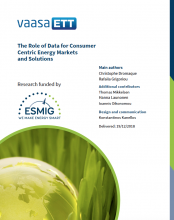Understanding how consumers engage with energy data is essential in delivering a “Clean Energy Package for all Europeans”
A new report that gathered 578 pilots involving 5,5 million residential consumers over the past 10 years sheds new light on consumer engagement and learning patterns. The research was commissioned by ESMIG and conducted by VaasaETT in November 2018.
In its new policy framework “the Clean Energy for All Europeans Package”, the European Commission highlights the key and central role of consumers in the global transition to a low-carbon society. It proposes to help consumers save money and energy through better information and give them a wider choice of action when choosing their participation in energy markets.
Fortunately, there are several trends converging to make consumer centric markets a reality. Already a majority of the EU member states (17) have taken a positive decision for a full roll-out of smart meters which will make available granular and reliable information about individual energy use. In addition, the increasing penetration of connected objects in homes and the decreasing costs of measuring and analysing ever-larger amounts of data will make real-time data ubiquitous.
However, households are still scarcely knowledgeable on what energy efficiency entails, how much energy they consume, how much they pay for it, why and how they should save energy. Also, increases in knowledge and concern from mass communication campaigns may not translate into observable change of behaviour, unless the general information is combined with other more tailored and targeted techniques.
This study reports on how consumers react to feedback on their electricity and gas consumption and what is the added-value of near real-time data in achieving other customer benefits. It does so by analysing the biggest database of feedback, dynamic pricing, home automation pilots and commercial roll-outs around the world.
”This study brings new and compelling analysis which confirms what many in the industry already know, that feedback produces good levels of consumer engagement and results in tangible energy savings. The number of trials included in the study from all over the world makes the conclusions enduring for policy makers everywhere”, stated Patrick Caiger-Smith, CEO at geo and Chair of ESMIG’s Consumer Energy Management Working Group
